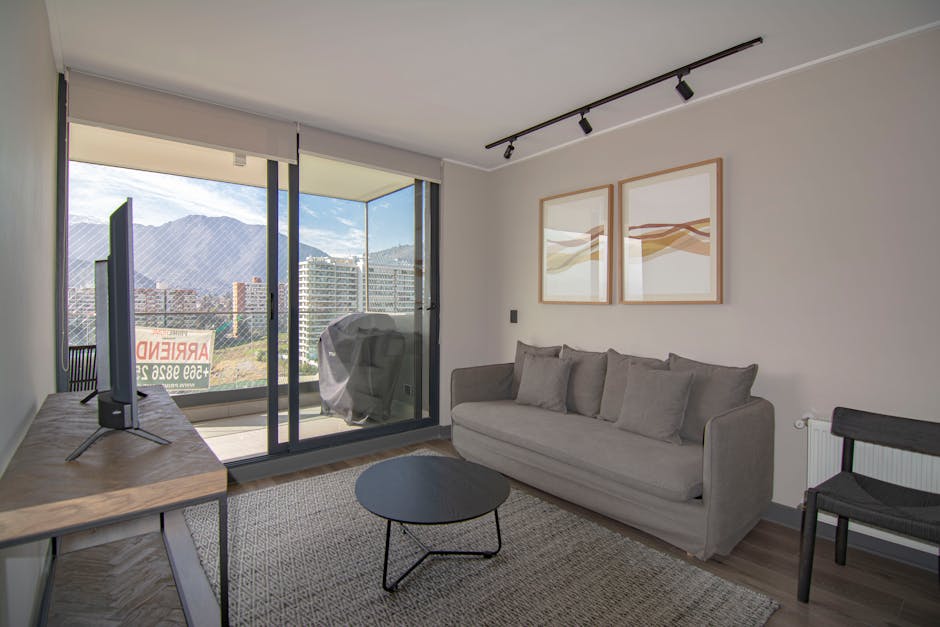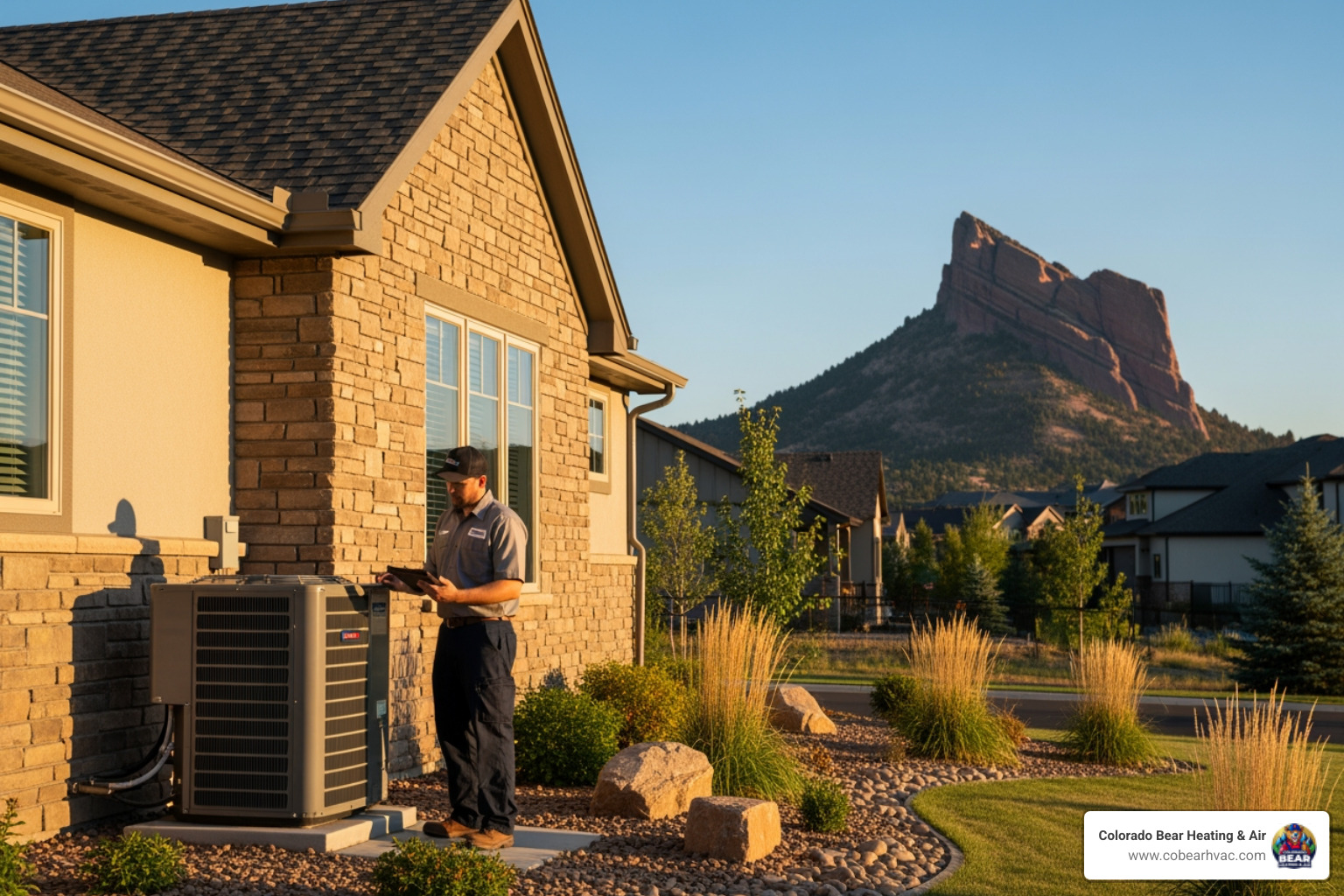
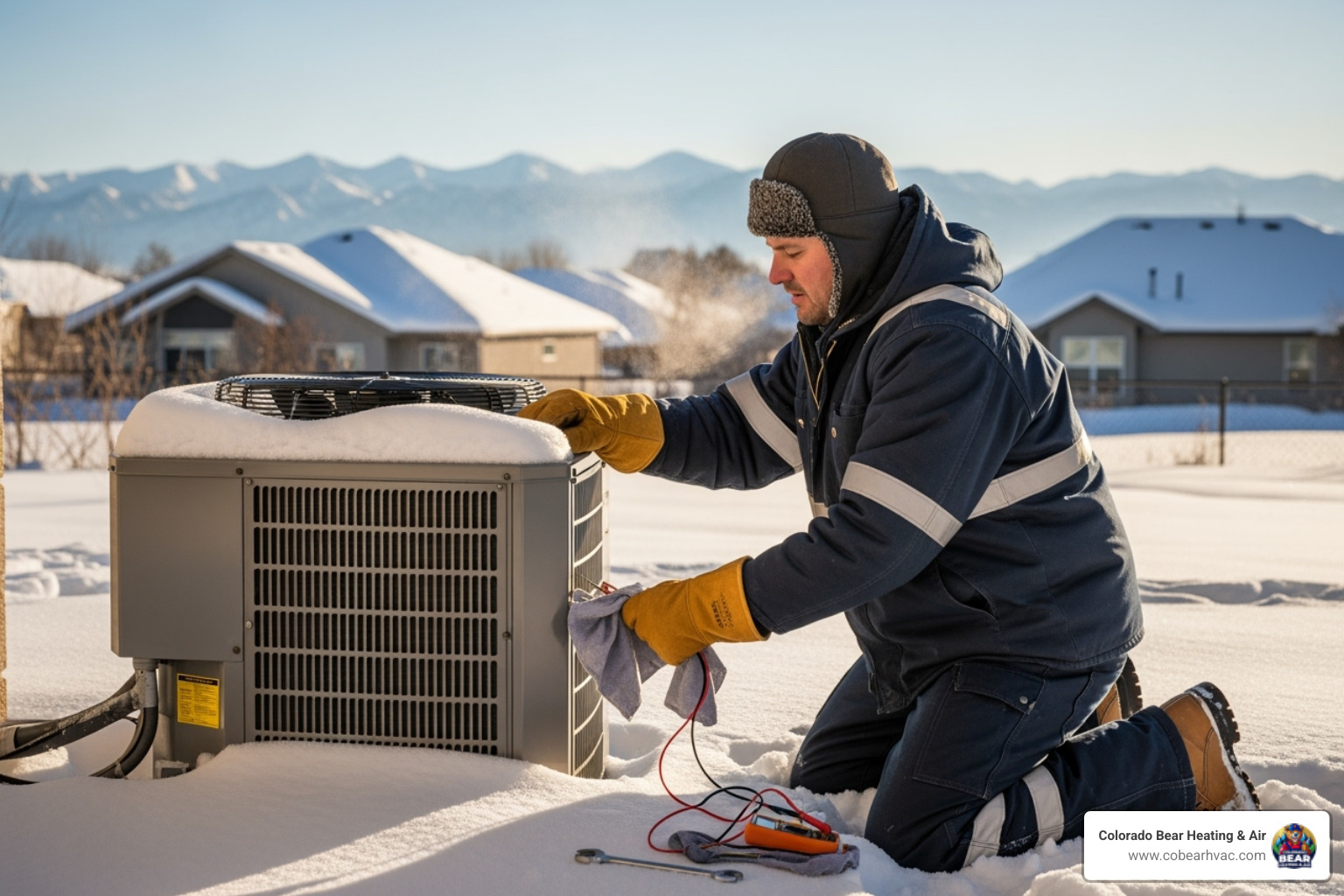

Why a Certified Technician is Crucial for Your Denver Heat Pump
Finding a certified heat pump technician in denver, co is essential for homeowners who want reliable, efficient heating and cooling. Denver's unique climate—with freezing winters and mile-high altitude—demands technicians who understand how heat pumps perform in challenging conditions. A certified technician ensures proper installation, efficient operation, and longevity of your system, helping you avoid costly breakdowns and high energy bills.
Top Reasons to Hire a Certified Heat Pump Technician in Denver:
- Proper System Sizing: They perform Manual J load calculations to match your home's exact heating and cooling needs.
- Cold Climate Expertise: Certified techs understand how heat pumps operate efficiently even below 0°F.
- Rebate Qualification: Only registered contractors can help you access Xcel Energy and Denver Climate Action rebates.
- Safety and Code Compliance: They ensure installations meet local building codes and manufacturer specifications.
- Warranty Protection: Proper installation by certified professionals keeps your equipment warranty valid.
Denver's altitude affects heat pump performance, and certified professionals have the training from organizations like NATE and the EPA to handle these nuances. They know how to optimize refrigerant charge, airflow, and defrost cycles for Colorado's conditions.
For comprehensive heat pump services, check out our Heat Pump Services page, or if you're ready to schedule service, contact Colorado Bear Heating & Air today.
Poor installation can increase energy bills by up to 25% and shorten your heat pump's lifespan from 15 years to just 10. Regular maintenance by a certified technician prevents common failures and ensures efficiency. Properly installed and maintained heat pumps can save homeowners $300 to $1,500 annually on electricity, often paying for themselves within 5 to 12 years.
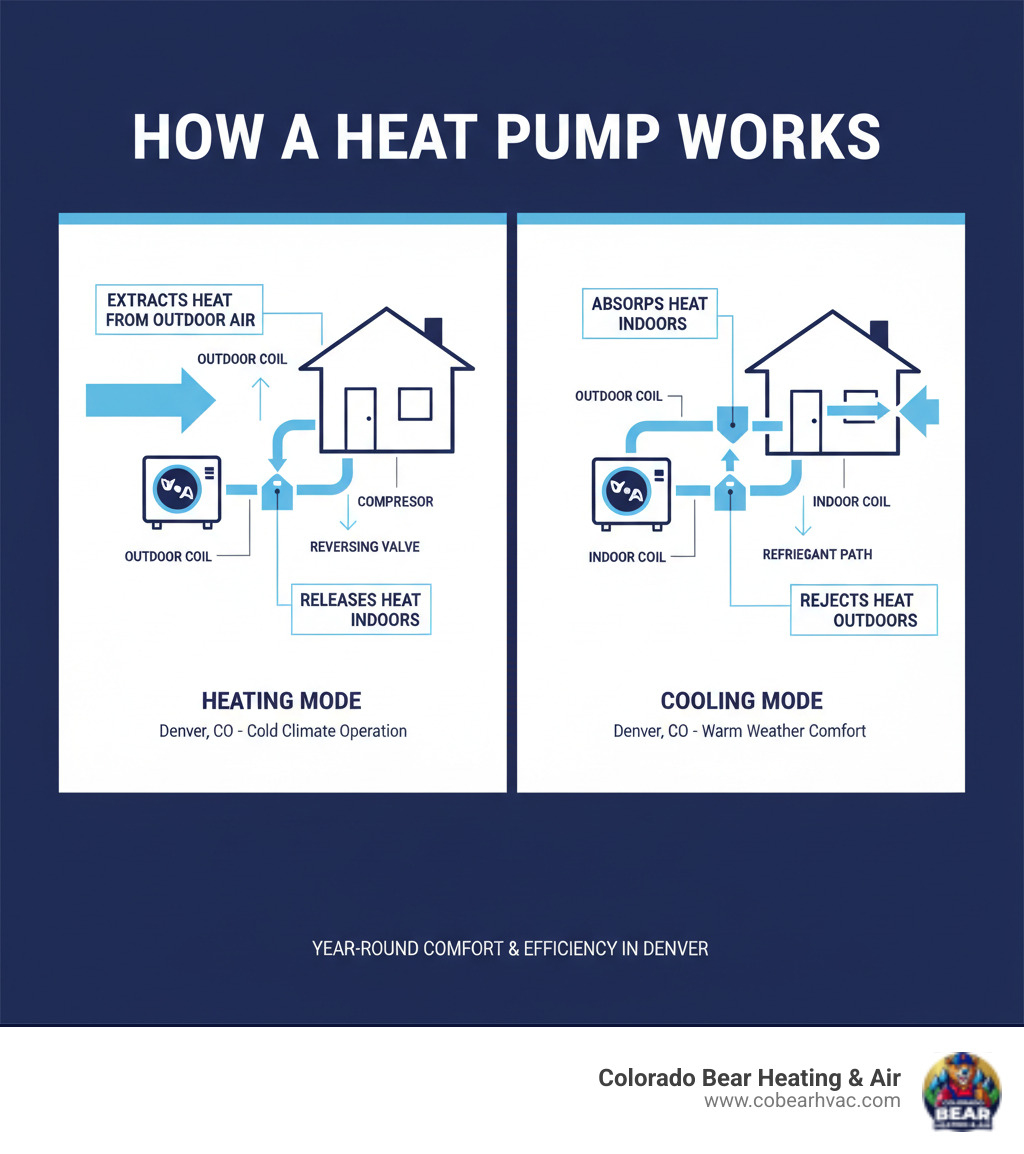
Denver's variable climate makes a heat pump a smart choice for year-round comfort, but the system is only as good as the technician who installs and maintains it. A certified heat pump technician in denver, co doesn't just fix problems; they optimize your system to handle Colorado weather, ensuring energy efficiency and extending its lifespan.
What "Certified" Really Means: Key Qualifications to Look For
You've probably seen the word "certified" thrown around, but it's not just marketing fluff. It's your assurance that the person working on your heat pump has proven expertise through rigorous training and testing. When you hire a certified heat pump technician in denver, co, you're getting someone who understands the complexities of these systems, especially in Denver's unique high-altitude, cold-winter climate. Let's break down the qualifications that separate the pros from the rest.
Essential Certifications for a Heat Pump Technician
Certifications are a technician's resume, telling you what they know and what they can legally do. Here are the credentials to look for.
NATE (North American Technician Excellence) is the gold standard in the HVAC world. Technicians must pass challenging exams that test real-world knowledge. A NATE-certified technician has demonstrated they can accurately diagnose problems and perform repairs correctly the first time.
EPA Section 608 Certification is legally required for anyone who handles refrigerants. Your heat pump relies on refrigerant, and mishandling it can damage your system and the environment. This certification proves a technician knows how to safely manage these substances. You can learn more about the different EPA technician certification types. Without it, a technician legally cannot perform many essential heat pump services.
BPI (Building Performance Institute) Certification takes things a step further. The BPI Air Conditioning & Heat Pump Professional credential shows a technician understands how your heat pump works within your entire home, not just as an isolated unit. This holistic view is crucial for maximizing energy efficiency. For details, see the BPI AC & Heat Pump Professional details.
Factory training from manufacturers like Lennox, Rheem, and Goodman adds another layer of expertise. These programs teach technicians the ins and outs of specific brands, including unique features and best practices for installation and repair.
Local licensing and insurance are absolutely essential. Proper licensing ensures your technician operates legally within Colorado, while insurance protects you and the technician if something goes wrong.
For comprehensive information about our approach to heat pump services, visit our Heat Pump Services page.
Experience and Reputation in the Denver Metro Area
Certifications tell you what a technician can do; experience and reputation tell you what they will do.
Years in business matter. A company that's served Denver for decades has earned customer trust and refined its skills through thousands of service calls. They've seen every problem Denver's climate can throw at a heat pump.
Online reviews on Google, Yelp, and the Better Business Bureau offer insights into other homeowners' experiences. Look for patterns regarding punctuality, professionalism, and fair pricing.
Local knowledge is invaluable. Our mile-high altitude affects heat pump performance, as lower air density impacts efficiency and sizing calculations. A local expert understands and accounts for these nuances.
Altitude performance understanding is essential. An experienced Denver technician will factor our 5,280-foot elevation into their recommendations, ensuring your system is properly sized and configured for optimal performance.
Cold climate expertise separates good technicians from great ones. Modern heat pumps work efficiently below 0°F, but only if installed correctly. A local expert knows which systems perform best in Colorado winters and how to optimize them.
If you're in the southern Denver Metro Area, our Heat Pump Services in Castle Rock, CO page offers more details about our local expertise.
At Colorado Bear Heating & Air, our technicians combine over 20 years of local knowledge with essential certifications to ensure your comfort.
How to Choose a Certified Heat Pump Technician in Denver, CO
Choosing the right certified heat pump technician in denver, co doesn't have to be daunting. You want someone knowledgeable, trustworthy, and who understands your specific needs to keep your home comfortable and your energy bills manageable.
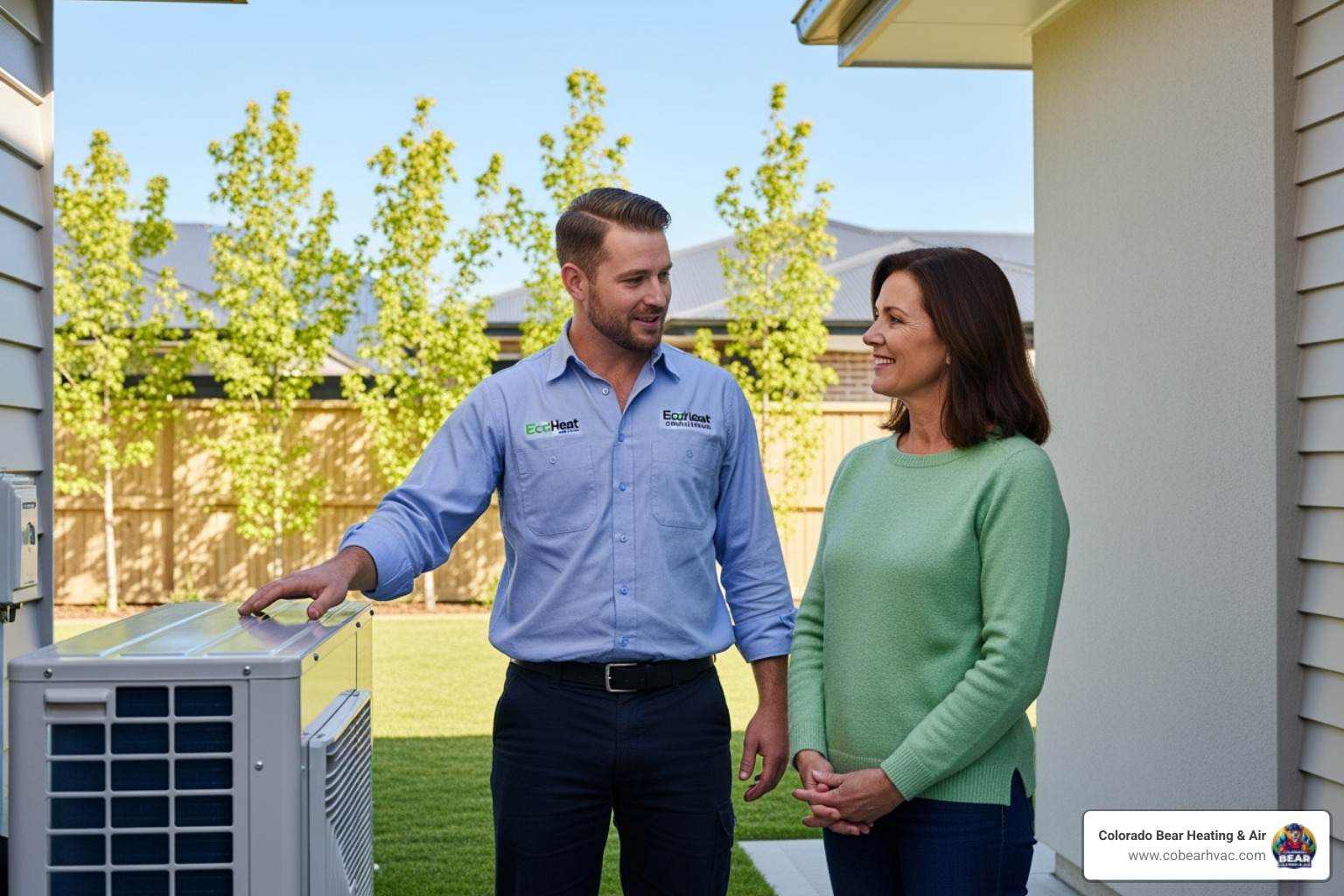
Start with a thorough vetting process. Ask friends and neighbors for recommendations and check online reviews on Google, Yelp, and the Better Business Bureau. Look for consistent feedback on professionalism, punctuality, and quality of work.
Ask the right questions when interviewing technicians. Inquire about their NATE and EPA Section 608 certifications, their experience with cold climate heat pumps, and if they are a registered Xcel Energy trade partner, which is crucial for rebates. A reputable technician will gladly provide proof of their credentials.
Get multiple quotes, but don't let the lowest price be your only guide. If a quote is significantly lower, ask why. A detailed, itemized quote that breaks down equipment, labor, and permit costs demonstrates transparency.
Understanding warranties is crucial. Manufacturer equipment warranties typically require professional installation. Additionally, quality HVAC companies offer their own labor warranties. Ask what's covered and for how long. Learn more about why this matters in our article on Why Hire for Heat Pump Installation.
Sizing and System Selection for Denver Homes
Proper sizing is one of the most critical steps, and it's where a certified heat pump technician in denver, co truly earns their keep. An undersized system will struggle to keep you comfortable, while an oversized one will waste energy and wear out faster. You need a system that's just right.
The Manual J load calculation is the industry standard for determining the perfect size. This isn't a guess based on square footage. A professional assessment considers your home's square footage, insulation, window quality, occupancy, and Denver's specific climate data, including our altitude. This meticulous process ensures your heat pump is perfectly matched to your home. For more on this, explore our Heat Pump Installation guide.
Efficiency ratings are another key factor. SEER2 (Seasonal Energy Efficiency Ratio 2) measures cooling efficiency, while HSPF2 (Heating Seasonal Performance Factor 2) measures heating efficiency. Higher numbers mean better efficiency and lower operating costs. In Colorado, we recommend systems with SEER2 ratings of 16+ and HSPF2 ratings of 9+ for optimal performance.
Cold climate heat pumps are engineered to perform well in places like Denver, maintaining efficiency even when temperatures drop below zero. Your technician should be knowledgeable about these systems and may discuss integrating a backup heating source for extreme cold snaps.
Understanding Rebates and Incentives
Generous rebates and incentives can substantially offset the cost of a new heat pump. A knowledgeable certified heat pump technician in denver, co can guide you through this process to maximize your savings.
Xcel Energy offers rebates for high-efficiency heat pumps, but you must use a registered contractor who meets their specific installation standards. Your technician should be familiar with these requirements and registered in Xcel's program. You can verify this by using their tool to Search for an Xcel Energy Trade Partner.
Denver Climate Action Rebates provide another layer of savings. Like Xcel's program, these rebates require installation by registered contractors who understand the compliance requirements. Ask potential technicians about their experience with both programs.
Federal tax credits may also be available for energy-efficient installations. A good technician will be current on available credits and can help you understand how to claim them.
The role of a certified technician extends beyond installation. They handle the necessary paperwork and ensure your project meets all program requirements, saving you time and ensuring you receive the money you're entitled to.
At Colorado Bear Heating & Air, we help homeowners maximize their rebates. We stay up-to-date on all programs to make the process as smooth as possible.
Common Services, Costs, and Maintenance Schedules
Your heat pump works hard year-round to keep your Denver home comfortable. Like any equipment, it needs regular attention to stay in top shape. A certified heat pump technician in denver, co provides the services needed to ensure years of reliable comfort. Understanding these services, their costs, and proper maintenance schedules is key.

Typical Services Offered by a Certified Technician
A certified technician offers a full range of services to keep your system running smoothly throughout its lifespan.
- Installation: Proper installation includes a Manual J load calculation, expert refrigerant handling, precise electrical connections, and ductwork setup, all meeting local codes and manufacturer specifications to protect your warranty.
- Repair Services: When things go wrong, a certified tech brings diagnostic expertise to pinpoint and fix issues correctly the first time. Our Heat Pump Repair page has more details.
- Routine Maintenance: Tune-ups are the most important service for preventing problems. A professional can clean components, verify performance, and catch small issues before they become expensive emergencies.
- Emergency 24/7 Service: Reputable companies offer around-the-clock service for when your system fails unexpectedly during extreme weather.
- System Replacement: When it's time to retire your old unit, a technician can guide you through choosing a new, efficient model and handle the installation.
- Ductwork Inspection: For ducted systems, technicians can inspect, clean, and seal ductwork to ensure optimal airflow.
For more on these services, visit our Heat Pump Services page or our Heat Pump Maintenance page.
Recommended Maintenance and Average Costs in Denver
Regular maintenance is the secret to a long-lasting, efficient heat pump. We recommend servicing your heat pump at least once annually, though twice-yearly maintenance (spring and fall) is ideal since it provides both heating and cooling.
A typical tune-up is a comprehensive check-up. A technician will check and replace air filters, clean indoor and outdoor coils for efficient heat transfer, verify refrigerant levels and check for leaks, and inspect and tighten all electrical connections. They will also test overall system performance and, crucially for Denver, verify the defrost cycle is working correctly to prevent ice buildup. Learn more about this in our article on Understanding Heat Pump Defrost Cycles.
Our Heat Pump Tune-Up page has more details on what's included.
Several factors influence service costs. Installation costs depend on the job's complexity and the type of heat pump. Repair costs vary based on the problem and parts required. Routine maintenance is typically a flat service fee.
At Colorado Bear Heating & Air, we believe in transparent pricing. We provide clear, upfront estimates before any work begins, so you never face surprise charges.
When to Call a Professional: Signs Your Heat Pump Needs Help
Your heat pump works hard through Denver's scorching summers and freezing winters. Knowing when to call a certified heat pump technician in denver, co can prevent minor issues from becoming major system failures. Ignoring warning signs or attempting complex DIY repairs often leads to more expensive problems.
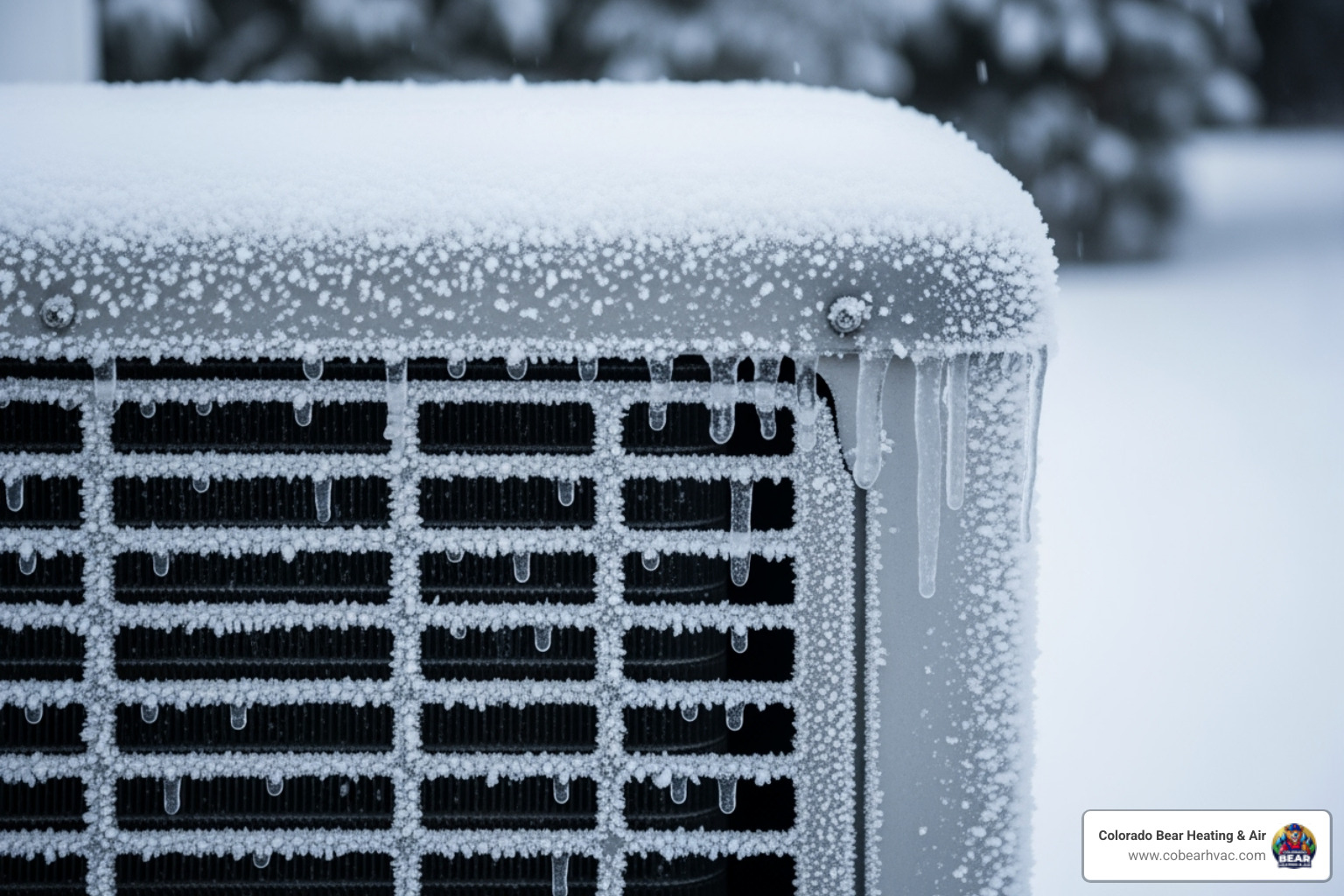
Troubleshooting Common Heat Pump Problems
Here are the red flags that mean it's time to call a professional.
- Inadequate Heating/Cooling: If the system runs constantly but can't reach the set temperature, or if airflow is weak, it could indicate a refrigerant leak, compressor issue, or blocked airflow.
- Strange Noises: Grinding, squealing, or rattling sounds suggest a mechanical problem like worn bearings or a loose component that needs immediate attention.
- Frequent Cycling: If your system turns on and off in short, repeated bursts, it's putting stress on the equipment. This could be caused by an oversized system, a faulty thermostat, or refrigerant issues.
- A Frozen Outdoor Unit: While some frost is normal, a unit encased in ice indicates a problem with the defrost cycle, low refrigerant, or restricted airflow. Learn how this should work in our article on Understanding Heat Pump Defrost Cycles.
- Sudden Spikes in Energy Bills: If your utility costs jump without a change in usage, your system is likely working harder than it should due to an underlying issue.
- Water Leaks: Puddles around your indoor or outdoor unit can signal a clogged condensate line or a more serious refrigerant leak.
- System Won't Turn On: After checking for a tripped breaker, a system that won't power on likely has an internal problem requiring professional diagnosis.
Our guide on Common Heat Pump Error Codes can help you decipher what your system is trying to tell you.
Repair or Replace? Making the Right Decision
When your heat pump fails, you face the choice of repairing or replacing it. A certified heat pump technician in denver, co can provide an honest assessment based on several key factors.
- Age of the Unit: Most heat pumps last 10-15 years. If your system is over a decade old and experiencing frequent issues, replacement is often the more cost-effective choice.
- Repair vs. Replacement Cost: A common rule of thumb is to replace the unit if a repair costs 50% or more than a new system, especially on an older unit.
- System Efficiency: Modern heat pumps with high SEER2 and HSPF2 ratings are far more efficient than older models. The long-term energy savings from a new unit can offset a significant portion of its cost. Our article on Heat Pump Installation Benefits details potential savings.
- Frequent Breakdowns: If you're constantly calling for repairs, your heat pump is likely at the end of its life. Investing in a new, reliable system provides peace of mind and ends the cycle of surprise repair bills.
A good technician will walk you through your options, considering your budget and long-term goals, rather than pushing an unnecessary sale.
Your Trusted Partner for Heat Pump Services in Denver
Finding the right certified heat pump technician in denver, co is about building a long-term partnership with an expert who understands your home and Denver's unique climate. You deserve a partner who will be there for you throughout the entire life of your heat pump system.
At Colorado Bear Heating & Air, we've spent over 20 years earning the trust of homeowners throughout the Denver Metro Area. We serve Castle Rock, Littleton, Centennial, Highlands Ranch, Lone Tree, Parker, Franktown, Denver, Aurora, Elizabeth, Sedalia, Larkspur, and Castle Pines. We're not a faceless corporation; we're your neighbors, and we take that responsibility seriously.
Our customer-first approach means you'll get honest advice, transparent pricing, and technicians who care about your comfort. We understand that HVAC issues are stressful, so we focus on making the experience as smooth and reassuring as possible.
Whether you need a new installation, an emergency repair, or routine maintenance, we have the expertise to get the job done right. Our knowledge of cold climate models and the latest energy-efficient technology ensures you receive the best possible service.
With a reliable partner like Colorado Bear Heating & Air, year-round comfort is assured. We're here to make sure your heat pump works flawlessly through every season Denver throws at you.
Ready to experience HVAC service that puts you first? Contact us for your Heat Pump needs today. Let's work together to keep your home comfortable, efficient, and worry-free.
Latest blogs

Apply now for flexible payment options
Get a decision in seconds with no impact to your credit score.



Testimonials
Service Areas
If you’re in Colorado Springs, The Mountains, or nearby areas, call us to confirm availability for installations.
.avif)















.avif)
.avif)
.avif)


